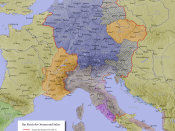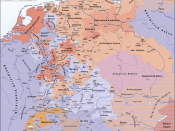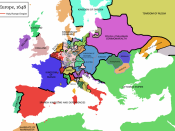The causes of the Thirty Years War can be traced as far back as the renaissance period. It was during the renaissance that such ideals as secularism, humanism, individualism, rationalism and above all else secularism was first apparent in main stream society (5). The Thirty Years War was one of the most important and bloodiest of the religious wars. An uneasy truce had existed in Germany since the Peace of Augsburg in 1555. This agreement allowed Lutheran and Catholic rulers to determine the religion of their subjects but it did not make any provisions for the inroads of Calvinism. Catholics were alarmed that the Lutherans were gainìing conversions and territory in violation of the settlement. Lutherans feared that the Peace of Augsburg would be undermined by Calvinist and Catholic gains. In the early seventeenth century, Germany was divided into the Protestant Union, and the Catholic League. The Protestant Union was supported by the English, French, and the Dutch, while the Catholic League was supported by Spain and the Hapsburg Empire (3).
The Thirty Years War was the first continental war in which all the major European nations were involved. The effects of the War would prove be religious, political, social, and economic turning points for Europe.
The religious settlement at Westphalia confirmed the predominance of Catholicism in southern Germany and of Protestantism in northern Germany. The papacy was denied the right to participate in German religious affairs, a restriction symbolizing the reduced role of the Church in European politics (8). The principle accepted by the Peace of Augsburg of 1555 that Catholic and Lutheran princes could determine the religion practiced in their territory was maintained, and this privilege was extended to include the Calvinists as well. The Austrian Habsburgs had failed in their efforts to increase their authority in the...


